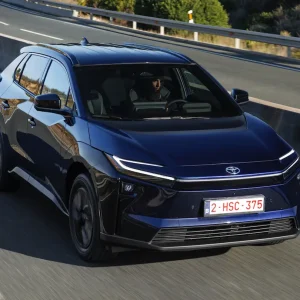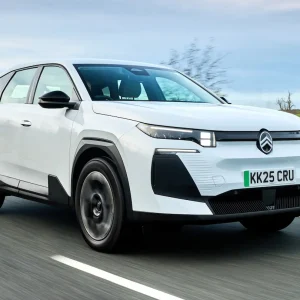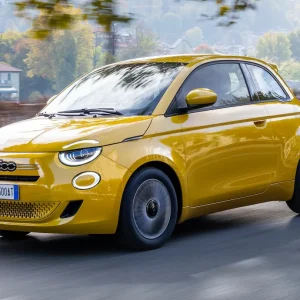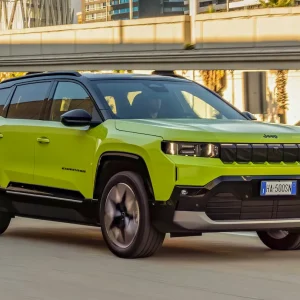The Range Rover Evoque has been a huge success for Land Rover since the original model launched in 2011. Its design struck a chord with user choosers after a premium SUV with relatively low running costs – the Evoque’s residual values have been impressive throughout its life – and it seems Land Rover has also understood its fleet appeal.
From launch, it was made available in front-wheel drive versions, and the second-generation model, launched last year, came to market with RDE2-compliant diesels in entry-level variants. This would allow company car drivers to avoid the 4% supplement in BIK tax on diesel.
While this forward thinking was to be applauded, it wasn’t class-leading in other areas. For example, while the Ingenium diesel engines are remarkably clean, and compliant well ahead of new regulations, fuel economy in the official tests didn’t quite hit the mark.
But the company has also been keen to adopt plug-in hybrid power, and its first petrol-electric models – the Range Rover and Range Rover Sport – were launched in 2018.
But late 2020 has seen a blitz of plug-in variants from Land Rover, with models announced for the Range Rover Evoque and Land Rover Discovery Sport line-ups almost a year ago, and with recent news of the Range Rover Velar and Land Rover Defender also offering PHEVs.
Available to drive now are the Range Rover Evoque and Land Rover Discovery Sport versions, the second of which we’ll look at next month.
Both use a new 1.5-litre turbocharged three-cylinder petrol engine in conjunction with a powerful electric motor. They wear the P300e badge, the figure pointing to the combined power output (309hp), the ‘P’ denoting the fuel needed, while the ‘e’ is for the electrified drivetrain.
When these cars were announced in the summer there was a predicted 41-mile EV range possible with the Evoque and 38 miles with the Discovery Sport, and CO2 emissions of 32g/km and 36g/km respectively.
This extra EV range would have put the Evoque into the 6% bracket for BIK tax in the current fiscal year, allowing it to look very attractive alongside rivals achieving 10%.
Land Rover says the coronavirus pandemic has prevented it from achieving certification for those figures so far, but hopes to complete it in future.
As a result, official figures for the Evoque suggest a range of up to 34 miles on electric only, with CO2 emissions from 44g/km, which means 10% BIK tax, making it competitive with rivals. But is it worth waiting for a version with lower tax, especially as we don’t know exactly when this will appear?
The Evoque remains probably the best-looking car in its sector, managing to combine familiar Range Rover styling cues in a smaller package. The interior managed to contain most functions within the touchscreen, while ventilation controls remain analogue and tactile. It really is the best balance for reducing dashboard clutter, while maintaining a good degree of user-friendliness.
We also welcome Land Rover’s fabric seat offering in our S grade test car. Many vehicle manufacturers are reconsidering materials used in vehicle production and looking for sustainable alternatives. The Evoque’s fabric managed to feel soft and comfortable, and we assume internal tests have proved it to be sufficiently hard-wearing.
Beware of Land Rover’s claimed luggage capacity of 591 litres with all the seats in place. Land Rover ignores standard measurements up to the luggage compartment cover. You’ll probably find the boot less accommodating than a BMW X1’s or Volvo XC40’s.
Performance is as strong as you’d expect, with the combination of instantaneous electric torque and turbo power chiming in later managing to offset the extra weight of the hybrid system. In fact, the three-cylinder engine saves 37kg over the four-cylinder petrol engine, so Land Rover has been careful to reduce weight where possible.
The ride is firm-ish, but not jarring, even on the 20in wheels of our test car, and driving the Evoque plug-in hybrid is a serene experience. Hopefully, Land Rover can get the 41-mile EV range certified soon, as it would make the Evoque a compelling choice in the five-seat premium SUV sector.
Range Rover Evoque P300e S
P11D: £44,650
Residual value: 52.9%
Depreciation: £20,995
Fuel: £2,215
Service, maintenance and repair: £2,784
Cost per mile: 43.3p
Fuel consumption: 141mpg
CO2 (BIK band): 44g/km (10%)
BIK 20/40% a month: 20/40%
Boot space: 591 litres (up to roof height)
Engine size/power: 1,498cc/309hp





